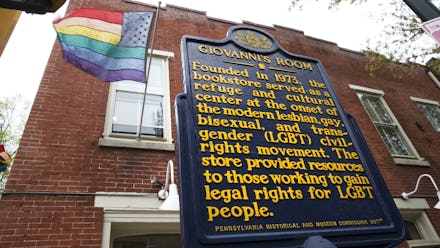Why We Still Need LGBT Bookstores

When news broke in late April that Giovanni's Room in Philadelphia, said to be the oldest LGBT bookstore in the country, will close its doors, many in the gay community took it as a death knell for gay bookstores and, worse still, a sign of gay literature's fading relevance. Though the store's closing fits in with a larger trend in the publishing industry — over 1,000 bookstores closed between 2000 and 2007 — it's understandable that the loss of the landmark has alarmed many concerned with the survival of the gay literary tradition.
Steve Berman, the founder of the gay publishing company Lethe Press and a former employee of Giovanni's Room, wrote in Salon: "The absence [of the store] will cause a ripple effect in LGBT publishing." Already, he said, "LGBT books are forced to the edges. Gay authors have to do more and more marketing to find readers. Gay publishers have to struggle with shrinking venues to showcase their titles."
In addition to shelf space for publishers of LBGT fiction, gay bookstores have historically served as havens for readers. Berman notes that gay bookstores — not only Giovanni's Room, but also Lambda Rising in D.C., Oscar Wilde in New York and A Different Light in California, all of which have now closed — allowed readers to find books with protagonists "with whom they could identify," even at a time when LGBT characters in more public forms of media, like film, were "punished for their desires."
Image Credit: AP
For readers of gay-centric literature today, book-buying is a completely different experience. Search "gay fiction" on Amazon and you're sure to draw up a list of results resembling Pornhub thumbnails. Free or cheap erotic ebooks, with titles like Naked Hero and Texas Rough, far outnumber serious fiction and nonfiction contributions, like Caleb Crain's 2013 novel Necessary Errors or Christopher Baum's 2012 Eminent Outlaws. In big-box book retailers, the situation is equally dismal. The gay section of Barnes & Noble is often, as Berman puts it, "a single shelf of mixed erotica and university presses with maybe a memoir or a book about Matthew Shepard."
But what, aside from a better book-buying experience and a claim on our nostalgia, can gay bookstores offer us, the current generation of curious readers, gay or straight or otherwise? We don't need gay bookstores to provide us with material unavailable anywhere else; we have movies, online magazines, TV shows, even entire TV networks, devoted to gay material. Nor do we need the protective shelter that gay bookstores once offered; it's OK, for the majority of us, to be seen in public reading E.M. Forster's Maurice or even LGBT fan fiction. In a post-closet era such as ours, do we really need gay bookstores at all?
Image Credit: AP
There are at least two reasons why we do still need them. For one, a cultural atmosphere of greater tolerance and political freedom does not necessitate the assimilation of gay people into the heterosexual universe.
The LGBT community, however loved/accepted/tolerated, will always be a minority. Our newfound sociopolitical liberties, instead of obliterating the need for a distinctive gay culture, should instead give us license to explore that culture and develop it further. We need gay bookstores, not as sanctuaries for the repressed, but as museums and libraries for the out and proud. As David M. Halperin points out in his book How to Be Gay, "Unlike the members of minority groups defined by race or ethnicity or religion, gay men cannot rely on their birth families to teach them about their history or their culture. They must discover their roots through contact with the larger society and the larger world."
Another thing to consider is that the project of LGBT literature is simply not finished. Transgender literature, as evidenced by the recent addition of a Transgender Fiction Award to the Lambda Literary Awards lineup, is only beginning to materialize as a genre in its own right. Gay-oriented YA too is a genre undergoing important changes that could benefit from the endorsement and personalized curation that gay bookstores provide. And with literature trending ever more global (i.e., translation-oriented), we should begin looking to other, less socially liberal countries for their narratives of repression, solidarity and self-discovery.
The story the book world has been telling itself about the seamless transition from bookstore to e-retailer proves especially turbulent and untrue in the case of gay literature. When it comes to preserving and expanding upon a rich and distinct LGBT culture, as well as providing support for those at the margins of our society, the primacy of brick-and-mortar gay bookstores remains, thankfully, unshaken.